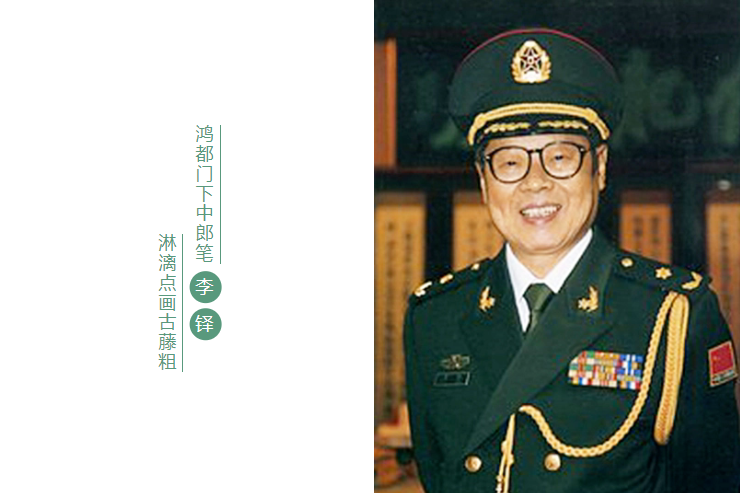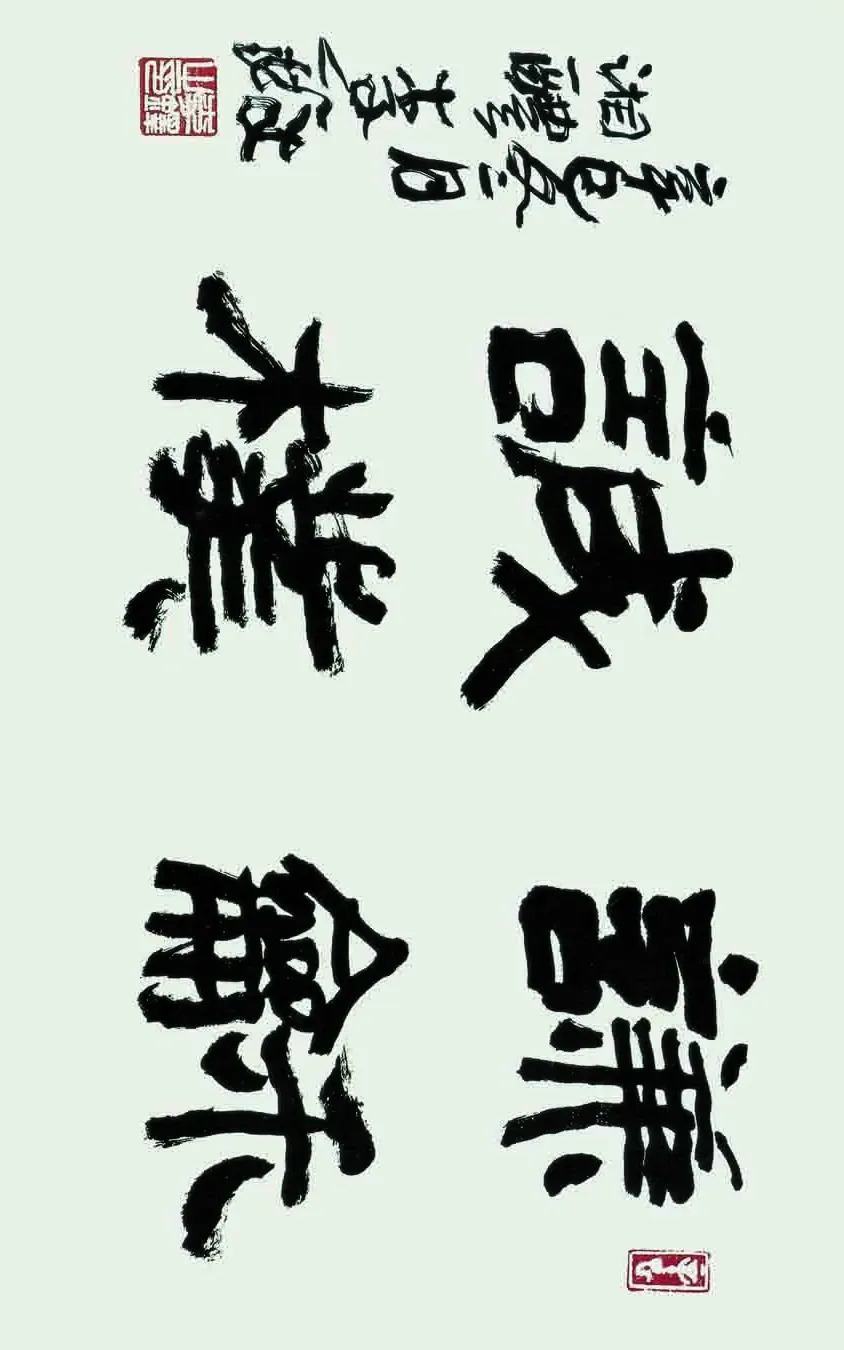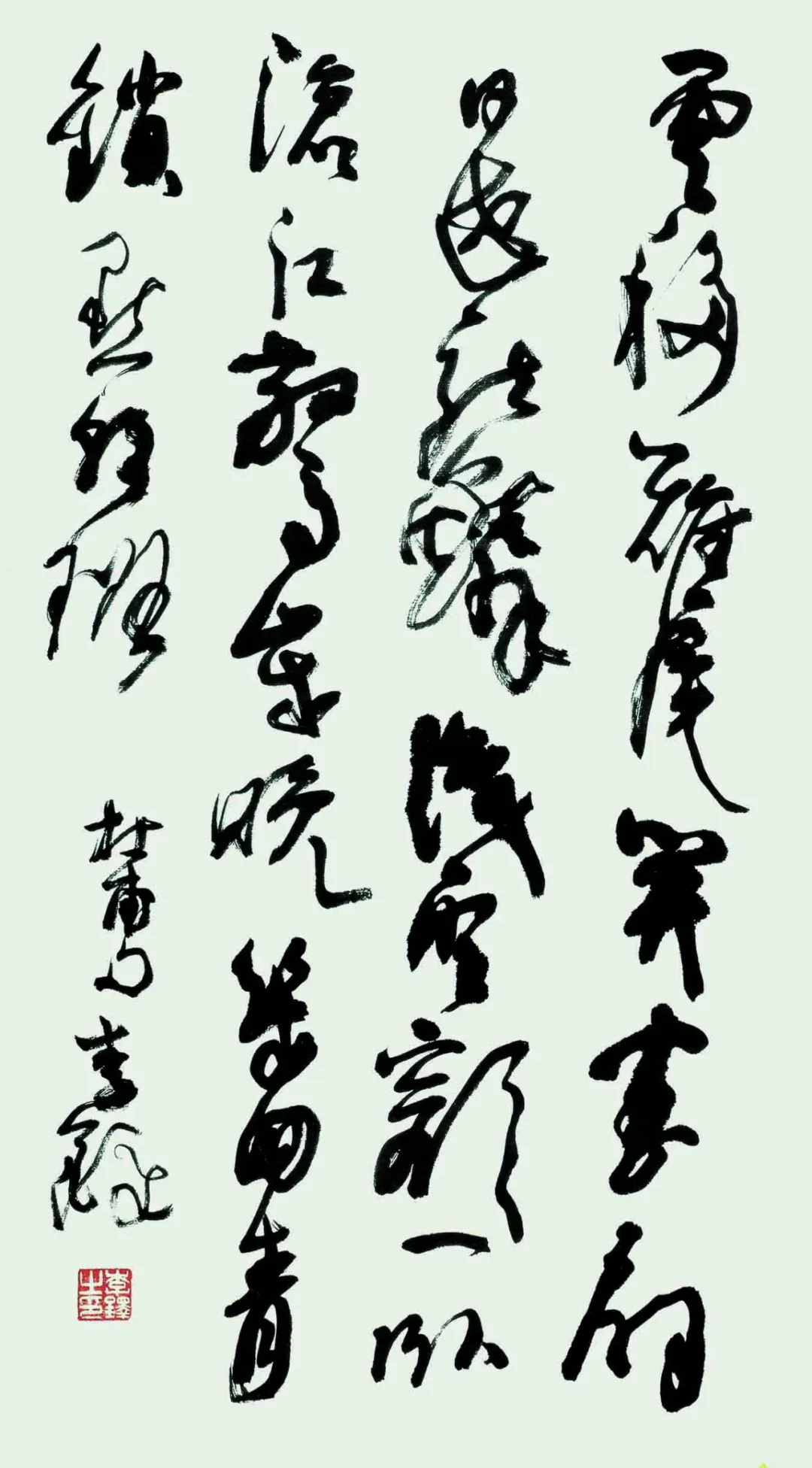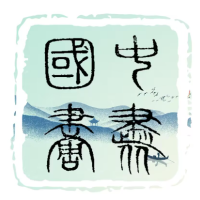李铎,字青槐,湘人也。生于春秋之交,湖南醴陵之小村,幼习书法,初不稳笔,先生令之画圆。曾以笔杆蘸墨为圆,师识其诡,责之,铎因悟真诚之重,遂舍妄从实,勤研墨道。涉猎秦篆、魏碑,至汉隶,颜、柳、欧、赵、王诸体,得古人笔意,章法自成,其作品既展技艺,亦传心声,观者得以心旷神怡之感。
Li Duo, styled Qinghuai, was a native of Xiang, born in a small village in Liling, Hunan at the turn of spring and autumn. From a young age, he practiced calligraphy, initially struggling with an unstable hand. His teacher commanded him to draw circles. Once, attempting to create perfect circles, he dipped the end of the brush handle in ink, a trick quickly spotted and reprimanded by his teacher. This lesson in sincerity profoundly impacted him, leading him to abandon deceit and earnestly study the art of ink. He delved into ancient scripts from Qin seals and Wei steles to Han clerical scripts, mastering the styles of Yan, Liu, Ou, Zhao, and Wang, grasping the ancient masters’ strokes and structures, creating works that not only displayed skill but also conveyed his inner voice, offering viewers a sense of boundless ease and pleasure.

李铎书法,承载汗牛充栋之气魄与脱略之风范,其心怀亦宽广而情感深邃。如其号青槐,坚韧不拔,根深蒂固,生生不息。每一笔画,皆重千钧,情溢言表,动荡诗章,铺陈墨海。不仅念旧山水之恩,感军旅之砺,亦传华夏之美。他之书法,如汉乐府旧题,有“汉广”之大气,又如宋词渲染,笔致苍劲,意境悠长。如杜甫诗中“风劲角弓鸣,将军猎渭城”,书中见其人品,品中显其学问。清杨守敬言:“未有胸无点墨而成为书家者”,盖指此也。铎艺精湛,不独挥毫,兼通诗词,国画亦佳。其花鸟、山水,用笔如行云流水,章法自如。
Li Duo’s calligraphy carried the immense vigor and effortless grace characteristic of his style, with a heart as broad and deep as his famed pseudonym Qinghuai suggests—resilient, deeply rooted, and ever-growing. Each stroke he made was laden with profound emotion, stirring the poetry and spreading across his sea of ink. He not only cherished the old rivers and mountains but also appreciated the tempering from his military life, spreading the beauty of Chinese culture. His calligraphy was reminiscent of ancient themes with the grandeur of Han music and the subtle strength of Song lyrics, strong strokes creating expansive and timeless scenes, as if depicting the vigorous winds and hunting scenes of generals by Du Fu, reflecting his character and erudition. Yang Shoujing once said, "No one becomes a master calligrapher without a profound internal cultivation," pointing directly to such a person as Li. His artistry was refined, extending beyond mere brush strokes to include poetry and painting, excelling in floral and landscape works with a brushwork as fluid as clouds and water, and layouts masterfully balanced.
青槐之名,既嵌入生命,又映照其艺。曰:“探幽索隐,继日以追”,此其自勉也。彼以笔墨为戈矛,以诗书报国,其事迹,可谓典范。如此风雅之士,实古今通变之秀,文墨流芳,犹抱琴瑟于涛声之上,雅意盎然。
The name Qinghuai, deeply embedded in his life, also illuminated his art. He exhorted himself with the couplet: "Exploring the obscure and seeking the hidden, pursuing day after day," using his pen and ink as if they were spears and swords, dedicating his poetry and books to serve the nation, his deeds truly exemplary. Such a cultivated gentleman indeed transcended the mundane, his literary grace like playing the zither above the roar of the ocean, with a refined and joyful essence.
李铎之书法蕴含军旅之精神,穿军装作书,以铁血之气凝笔墨,自言:“心始安稳。”军中岁月,淬炼其性,使之笔锋若出将入相,气势如千军万马,行笔之际,恰似布阵列疆,心随意转,胜不骄败不馁,铁骨铮铮,写尽英雄本色。青槐与戎马为伴,笔走龙蛇,挥之则风生水起,落之则波澜壮阔,深受军中士卒之爱,咸认其书法能显战士之刚健。书法,不仅传技,亦传心。是年,青槐挥毫《孙子兵法》,以其军旅生涯之所学,点画间展现兵家之大略,自觉天时地利人和皆备,古今交融,意味深长。其书一经展出,轰动京师,诸多赞誉纷至沓来,启功老先生亲笔赞曰:“猿臂伸来录异书,淋漓点画古藤粗。鸿都门下中郎笔,视此豪情逊不如。六千文字百余石,信手镌来若等闲。纵使庞涓逃树下,也难擎此重如山。”李铎书法,其势虽磅礴,其心仍淳朴,希望以此激励军营中人,使其书法之趣益深。青槐之笔,承载着军魂与文韵,以坚韧之志贯穿书法之道,续写华夏之千秋大业。如是,其墨海深深,波澜壮阔,于静处听风,于动中观变,绘声绘色,笔下生风。
Li Duo’s calligraphy was imbued with the spirit of military life, wearing his uniform while writing to consolidate the vigor of his martial spirit, declaring, "Only then does my heart settle." His years in the military honed his character, making his brushwork as strategic as commanding troops, as powerful as a thousand horses charging, his mind agile across the battlefield of paper, undefeated in spirit, embodying the true essence of a hero. His camaraderie with soldiers, who deeply admired his robust and vigorous style, recognized his calligraphy as a reflection of a soldier’s strength. Not just transmitting skills, his calligraphy also conveyed the heart. In that year, Qinghuai boldly composed "The Art of War" by Sun Tzu, applying his military insights into his strokes, capturing the essence of ancient and modern strategies, feeling that heaven, earth, and human harmony were aligned. Once exhibited, his work sent ripples through the capital, drawing widespread acclaim, with the elderly master Qi Gong praising, "His brush extends like the arm of an ape, his ink laying down thick as ancient vines. Under the Emperor's gate with the brush of a court official, this grandeur is unmatched. Six thousand characters, a hundred stones, casually carved as if mere trifles. Even if Pang Juan were to flee beneath the trees, he could not bear the weight of this mountain." Li Duo's calligraphy, though powerful, remained grounded, hoping to inspire fellow soldiers to deepen their appreciation for the art. His pen, carrying the soul of the military and the finesse of literature, continued to write the grand narrative of China’s enduring culture. In such tranquility, he listened to the winds of change, his brush dancing to the rhythms of the world.


















青槐少时学书,即感书法之纯洁光华,亦因乡梓之情,早识人间暖意。既长,功名显赫,常思乡土之恩,屡捐金砌桥,开设农书馆,办书法班,于母校置奖学金以资后学,书末必题“湘人”“湘东”“湘醴”,使其名垂乡里。又吟诗云:“日梦潇湘风,夜梦潇湘雨。更梦潇湘一片云,载我潇湘去;俯首看潇湘,美景清如许。帝子乘风下翠岚,我亦随风与。”其诗中情深意长,虽重用“潇湘”之词,而读之不觉繁冗。
From a young age, Li Duo felt the pure glory of calligraphy and the warm humanity of his hometown. As he grew in fame, he never forgot the nurturing of his homeland, frequently donating funds for bridges, establishing libraries for farmers, organizing calligraphyes, and setting up scholarships at his alma mater. He always signed his works as "the man from Xiang," "from eastern Xiang," or "from Xiang Liling," ensuring his name carried the fragrance of his homeland. He composed poems like, "Daydreaming of Xiang's winds, night dreaming of Xiang's rain. Dreaming further of a cloud over Xiang, carrying me to Xiang; looking down at Xiang, the scenery so clear. As the emperor's child rides the wind down verdant peaks, I too follow the wind." Despite the repetitive use of "Xiang," his verses never felt redundant but flowed with deep emotion and charm.
青槐才华横溢,书画诗三绝,常言:“诗书画,皆吾之至爱,相互为用,共成一体。”其画工亦精,国画中花鸟生动,用草书笔法,章法讲究疏密有致。山水画本写生,气息生动。所作《绣手帕》一诗,云:“谁家女,牡丹花,针针线线绣手帕。绣出红艳艳,绣出心里话。待到心花绣满枝,悄悄送给他。”此诗简约而意味深长,启功见之,频频击掌赞好。又评其书法与诗词,言其“有诗才”,“无失律”,兼具意韵,足见其文艺之高远也。
Li Duo was immensely talented, mastering calligraphy, painting, and poetry, often stating, "Poetry, calligraphy, and painting are all my beloved pursuits; they complement each other and form a cohesive whole." His painting skills were also refined, with his bird and flower paintings lively and his landscape paintings based on real-life observations, full of life. He once wrote a poem for his painting "The Embroidered Handkerchief," saying, "Whose girl embroidering a peony flower, stitch by stitch, line by line on a handkerchief. Embroidering out bright reds, embroidering out heartfelt words. When the heart's flowers bloom fully on the branch, secretly given to him." This simple yet evocative verse, praised by Qi Gong, who often applauded his ability to writeical poetry with genuine poetic talent, without losing the meter or the essence, truly showcased his profound artistic vision.

逢青槐八十寿辰,自勉以联:“探幽索隐,继日以追。”言其不懈于书艺之探求也。如幽谷之行者,终日追寻不辍。庚子年九月十七日,青槐与世长辞,寿九十。
憶昔青槐伢子,步履从容,于军营之雪原,执巨扫为笔,以大地为纸,挥墨如海,浩荡无垠。后踏国际书坛,如入无人之境,手书铁画银钩,天下称颂,花落掌声,交织成赞。
On his eightieth birthday, Li Duo reminded himself with the couplet: "Exploring the obscure and seeking the hidden, pursuing day after day," indicating his unrelenting pursuit of artistic exploration, like a traveler tirelessly exploring a secluded valley. On September 17, 2020, Qinghuai passed away, aged ninety.
In memory, it seems one can still see Qinghuai as a young man, gracefully striding through the snowy fields of the military camp, using a large broom as his brush and the earth as his paper, his ink flowing as boundlessly as the sea. Later, he stepped onto the international stage of calligraphy, where, as if in a realm all his own, he wielded his brush with the prowess of an iron-sculpted, silver-hooked calligrapher, receiving accolades and applause, weaving them into a chorus of praises.
责任编辑:苗君
